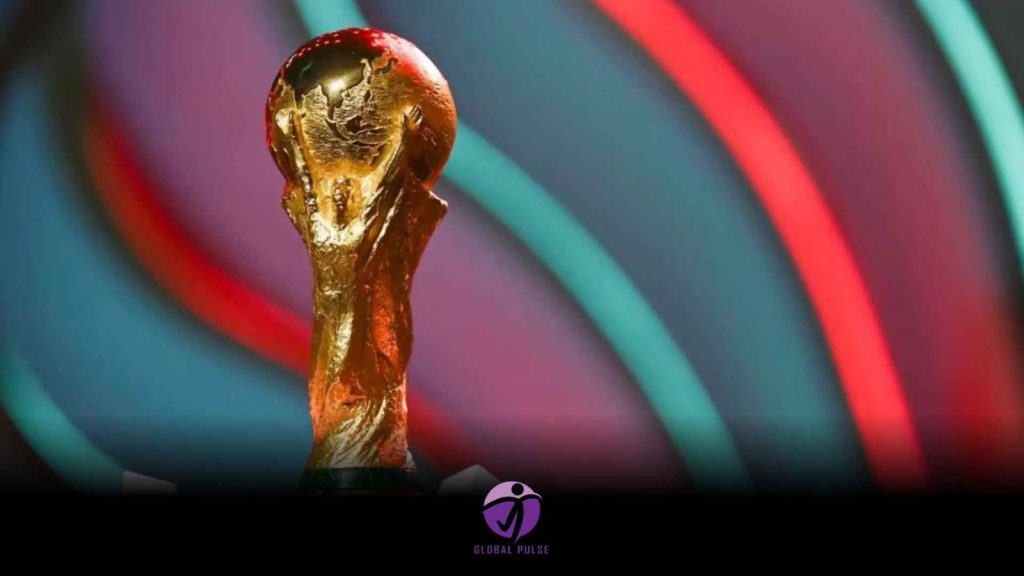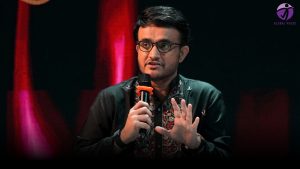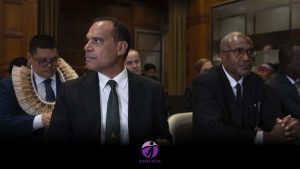FIFA’s announcement that Saudi Arabia will host the men’s 2034 World Cup has sparked significant debate, particularly given the nation’s ongoing human rights and environmental challenges. This decision marks a pivotal moment for the organization, raising questions about its priorities and the implications for the sport.
While many critics may express dismay at the prospect, it is unlikely that anyone will be taken aback, considering the significant impact of the kingdom’s unprecedented investment in sport.
The tournament raises questions about whether it is being leveraged to reshape Saudi Arabia’s global image or if it could serve as a driving force for social reform within the country. This raises important questions about FIFA and the broader landscape of football.
Why is this called a coronation rather than a contest?
A ‘virtual’ meeting of Fifa’s Congress is set for Wednesday afternoon, where official confirmation regarding a Saudi World Cup is expected to be announced.
However, this has been a mere formality for over a year now. In October 2023, reports indicated that the Saudi bid would face no opposition, as Australia—the only other potential contender—opted not to pursue the opportunity. This decision suggested recognizing the challenges posed by FIFA’s tight timeline, which allowed less than a month for any potential challenge to be organized.
Fifa has stood by its expedited process, which critics claim fell short regarding transparency and accountability. Critics argue that this decision has effectively set the stage for Saudi Arabia, as it mandates that the 2030 World Cup will occur across three continents, with Spain, Portugal, and Morocco serving as co-hosts and the initial matches occurring in South America. The rotation policy stipulated that only bids from Asia and Oceania would be considered for the 2034 event.
Saudi Arabia and FIFA, led by President Gianni Infantino, have established a significant partnership that merits attention. The nation served as the host for FIFA’s 2023 Club World Cup, while the governing body has secured a profitable sponsorship agreement with Aramco, the state-owned oil behemoth of Saudi Arabia.
Widespread speculation surrounds the possibility of Saudi Arabia’s Public Investment Fund (PIF) investing significantly in streaming giant DAZN. This comes in light of DAZN’s agreement to broadcast the inaugural edition of the expanded Club World Cup, a project championed by FIFA President Gianni Infantino, scheduled for next summer.
The recent late-night release of Fifa’s evaluation report, crafted by Secretary General Mattias Grafstrom, has further solidified the perception of certainty surrounding Saudi Arabia’s bid. The bid received an impressive average score of 4.2 out of 5, marking the highest rating.
The absence of a media conference to clarify the positive evaluation has raised eyebrows, particularly given that the bid was classified as ‘medium risk’ concerning human rights and ‘low-risk’ for environmental protection, igniting backlash from activists.
In a notable shift from conventional voting procedures, Congress is anticipated to confirm ratification by acclamation. This method leaves dissenting national associations with limited options for expressing their opposition, primarily through their choice to abstain from the ensuing round of applause.
Although the exact protocol is not yet defined, indications suggest that associations may be requested to express their backing for both the unopposed bid from Spain, Portugal, and Morocco for the 2030 World Cup, as well as the Saudi bid for 2034, potentially consolidating the support into a single declaration rather than issuing separate endorsements.
Fifa can assert that selecting hosts through uncontested bids is an improvement over previous practices, which often involved lengthy competitions among multiple nations susceptible to vote-swapping and corruption attempts. As a global organization, they are responsible for expanding their flagship event into new regions.
On Tuesday, it was reported that auditors BDO had determined the process was carried out with objectivity, integrity, and transparency.
What have other countries stated?
Norway’s football federation has abstained from the acclamation, citing concerns that the bidding process “undermines Fifa’s reforms for good governance” and “challenges trust in Fifa.” The statement highlighted that Fifa’s due diligence guidelines were not adhered to, which “increases the risk of human rights violations.”
It is anticipated that most federations beyond Western Europe will support the Saudi bid. The DFB in Germany acknowledged the criticism from the applicant country, stating that it “took the criticism seriously…[but] our goal is to work together with Fifa to improve the situation in the coming years.”
The Football Association has not yet announced its stance, though sources from BBC Sport indicate that some senior officials are cognisant of human rights issues. They express caution about potential accusations of hypocrisy should they choose not to support Saudi Arabia while simultaneously seeking England’s participation.
External sources have primarily driven the scrutiny directed at the sport. In March, the Guardian reported discovering significant evidence indicating a troubling trend of unexplained deaths among Bangladeshi migrant workers in Saudi Arabia. The nation stood firm in its defense of existing regulations and standards. At the same time, FIFA faced mounting pressure to obtain binding commitments for reforms from external sources before the World Cup’s awarding.
In October, an independent report from the Saudi branch of a prominent law firm, submitted to FIFA during its bid evaluation, faced criticism from human rights organizations for overlooking the purported mistreatment of migrant workers. In a recent statement, Amnesty International called for Fifa to suspend the bidding process, emphasizing the need to prevent further deterioration of an already critical situation. The organization cautioned that proceeding with a tournament in Saudi Arabia could lead to discrimination against fans, forced evictions of residents, exploitation of migrant workers, and potentially result in loss of life.
Concerns have emerged regarding Saudi Arabia’s increasing presence and influence in the world of football. In October, over 100 professional women’s footballers came together to sign an open letter directed at Fifa, demanding the removal of Aramco as a sponsor. They described the association as a “punch in the stomach.”
Concerns have been raised that numerous players may hesitate to voice their opinions due to the potential risk of jeopardizing a profitable transfer to the Saudi Pro League. Additionally, the challenge for footballers to take a firm stance is compounded by the willingness of governments to engage in business dealings with Saudi Arabia. This week, UK Prime Minister Keir Starmer visited the kingdom to bolster economic connections between the two nations.
What will the Saudi World Cup resemble?
The Saudi Football Federation has described the event as “extraordinary.” The proposal outlines plans for 15 stadiums, encompassing three currently under construction and eight where work has yet to commence. These venues are spread across five host cities, including the ambitious yet-to-be-constructed development of Neom.
FIFA’s evaluation report commends “a variety of impressive stadiums that, once constructed or renovated, could provide cutting-edge infrastructure.”
The event is expected to take place during the winter season. However, a significant distinction may arise when compared to the tournament held in neighboring Qatar from November to December 2022.
Fifa has acknowledged that summer temperatures in Saudi Arabia “can exceed 40C,” indicating an “elevated risk in terms of event timing” for the 2034 tournament. The organization highlighted the need to consider “climatic conditions” and “religious events,” prompting speculation that the event could be scheduled in early January to prevent a conflict with Ramadan.
According to the PA news agency, the Premier League and other leading European leagues are set to oppose the idea of a winter World Cup.
The mid-season pause of domestic leagues to facilitate Qatar 2022 has raised concerns about the implications of expanding European club competitions and increasing the World Cup to a 48-team format. This development is expected to complicate an already crowded sporting calendar further.
What does this indicate about Saudi sports influence?
The ratification of a Saudi World Cup is seen by many as a definitive showcase of the nation’s growing influence in sports, highlighting the opportunities, disruptions, and controversies that have emerged alongside this power shift.
Since 2021, the kingdom has poured billions of pounds into hosting events, a move initiated by the Crown Prince, the country’s de-facto ruler, as part of his ambitious ‘Vision 2030’ strategy to modernize and diversify the economy. The kingdom has hosted various high-profile sporting events, including Formula 1, the Spanish and Italian Cup finals in football, the Club World Cup, and premier competitions in boxing, golf, horse racing, and tennis.
The country’s Public Investment Fund has initiated the LIV golf series, assumed control of four clubs in the Saudi Pro League, and acquired Newcastle United.
A recent report from the Danish organization Play the Game uncovered that Saudi Arabia has entered into over 900 sponsorship agreements and established numerous formal partnerships with football federations to broaden its influence within the sports arena.
Staging a World Cup represents a significant milestone in Saudi Arabia’s sporting transformation, potentially setting the stage for a future Olympic bid.
Is this nothing more than sportsmanship?
Numerous critics regard this as the most significant instance of sports washing in FIFA’s history, with the World Cup being leveraged to enhance the reputation of a nation that has endured years of scrutiny over various issues, including:
Campaigners recognize the significant reforms achieved in recent years, particularly regarding women’s rights. However, they also highlight the ongoing repression that persists.
In 2023, Saudi Arabia recorded the third highest number of executions globally, with three hundred individuals having been executed thus far, marking a record high according to official statistics. This year, Manahel al-Otaibi received an 11-year prison sentence for utilizing social media to advocate against regulations requiring women to obtain permission from a male relative for marriage or travel.
Reprieve, a campaign group, stated, “This is one of the world’s most brutal authoritarian regimes investing significant resources to cultivate a misleading image, diverting attention from escalating repression and state violence.”
Numerous individuals who have been executed or are presently under a death sentence include protesters and those whose only offense has been the possession of minor quantities of cannabis.
“Individuals considering a trip to Saudi Arabia in 2034 must recognize that this nation imposes severe restrictions on freedoms that are often taken for granted in democratic societies, with dire consequences for those who defy these limitations.”
Saudi authorities maintain that their initiative aims to diversify the economy, enhance tourism, catalyze modernization and reform, and encourage a more active lifestyle among the youth.
In the previous year, the nation’s sports minister, Prince Abdulaziz bin Turki Al Faisal, staunchly defended the country’s entitlement to host the tournament, asserting that allegations of sportswashing were “shallow.”
He stated, “We have hosted over 85 global events and have consistently delivered at the highest level.” The goal is to draw global attention through sports. Every nation has areas where it can enhance its performance; perfection is unattainable. Acknowledging these events catalyzes reform, paving the way toward a more promising future for all.
In a significant shift, women in Saudi Arabia gained the right to enter sports stadiums to watch matches in 2018. This milestone has paved the way for establishing a professional women’s football league and a national women’s team, resulting in over 70,000 girls participating in the sport regularly.
Last year, Jake Daniels, the sole openly gay active male professional footballer in the UK, expressed to the BBC his concerns about safety at a World Cup in Saudi Arabia, stating he “wouldn’t feel safe.”
In response to concerns from female and gay fans about their safety at the event, Prince Abdulaziz assured that “everyone is welcome.”
Could Saudi 2034 bring about change?
Despite Qatar’s successful execution of a secure and memorable World Cup that captivated numerous fans, lingering controversies surrounding human rights issues, discriminatory laws, and the significant disruption to the football calendar due to the unprecedented winter scheduling may resurface in future tournaments.
In 2010, Qatar’s unexpected triumph in the vote to select the host for the 2022 World Cup caught FIFA’s leadership off guard. In a notable contrast, Infantino has expressed support for the concept of a World Cup hosted in Saudi Arabia. FIFA’s introduction of a human rights policy in 2017 may intensify scrutiny surrounding its decisions, particularly regarding any potential negative impacts on workers.
The upcoming World Cup in Saudi Arabia is set to see a significant reliance on migrant workers from South Asia for its infrastructure development. With over 13 million foreign nationals residing in the country, the extensive construction efforts have raised various concerns among observers.
FIFA’s internal report has determined that “several severe human rights impacts did ultimately occur in Qatar from 2010 through 2022 for several workers connected to the World Cup.” The situation encompassed a range of serious issues, including fatalities, injuries, and health complications; prolonged delays in wage payments; and mounting financial burdens. A valid case is presented: Fifa played a role in inevitable consequences.
The intense media scrutiny surrounding the lead-up to Qatar’s World Cup has prompted some labor reforms. However, campaigners express concerns regarding the actual implementation of these changes. They are outraged that Fifa has failed to act on a crucial recommendation from its report, specifically the provision of financial compensation to affected workers.
In a conversation last year, Prince Abdulaziz expressed confidence that the challenges faced by Qatar regarding workers’ rights would not be repeated. He stated, “We have 10 years to work on that. We have already started in many venues, so we have a long time to do it correctly.”
In its evaluation report concerning Saudi Arabia, FIFA highlights “areas where further legal reforms are needed and… effective enforcement, without which the risk of indecent working conditions could be elevated.”
FIFA has praised the Saudi government’s dedication to upholding internationally recognized human rights regarding competition. This includes a focus on safety and security, labor rights, children’s rights, gender equality, non-discrimination, and freedom of expression, encompassing press freedom.
The report highlights significant gaps and reservations in implementing relevant international standards concerning diversity and anti-discrimination. FIFA asserted that there is “a good potential that the tournament could serve as a catalyst for some of the ongoing and future reforms and contribute to positive human rights outcomes.”
Amnesty described the assessment as “an astonishing whitewash of the country’s atrocious human rights record.” Urgent reforms in fundamental human rights are necessary in Saudi Arabia, as the 2034 World Cup risks being overshadowed by issues of exploitation, discrimination, and repression. Campaign group Fair Square criticized Fifa, stating that the organization had “plumbed new depths.”
What is the state of the environment?
Advocates have persistently criticized the most significant oil exporter globally for contributing to climate change via its fossil-fuel sector and for hindering efforts to combat climate issues.
Concerns have been raised regarding the implications of hosting a 48-team tournament. Critics highlight the significant energy demands for cooling systems, the need for water desalination, and the carbon-intensive nature of related infrastructure projects.
The Saudi government asserts its commitment to diversifying from fossil fuels. It aims to lower emissions while firmly dismissing allegations that it is leveraging sports to divert attention from its sustainability record.
FIFA’s World Cup evaluation report stated, “While the scale of construction is likely to have a significant environmental impact, the bid lays a solid groundwork for implementing mitigation measures to tackle various environment-related challenges.”
Last year, FIFA faced significant damage to its credibility when a Swiss regulator determined that the organization had issued false statements regarding the environmental impact of the Qatar 2022 World Cup, which it had touted as the first “fully carbon-neutral World Cup.”
In addition, Qatar has developed seven new stadiums, whereas Saudi Arabia is constructing 11 and renovating four more. In Qatar, 64 matches were held, but the upcoming Saudi 2034 event is set to include 104 matches, raising concerns about a potentially more significant environmental impact.
What does this mean for sport?
Hosting the World Cup in Saudi Arabia highlights a remarkable transformation in the dynamics of global sports power, increasingly gravitating towards the Middle East.
Not long ago, the prospect of the tiny nation of Qatar and its neighbor Saudi Arabia hosting World Cups within a mere 12-year span would have seemed unimaginable to many observers. Considering the affluence of these nations and the ambitions of sports organizations to expand their financial horizons and tap into new markets, such developments are now inevitable.
Saudi Arabia can highlight that it is not alone in being a controversial host of a major sporting event in recent years. Over the last twenty years, Russia has been the venue for the World Cup and the Olympics. China has been the host nation for both the Summer and Winter Olympic Games.
In 2030, the co-hosts of the World Cup, Morocco, and Qatar, maintain laws that render same-sex relationships illegal. Environmental campaigners have voiced their concerns regarding the decision to host the 2030 World Cup across three continents.
Amnesty International has recently raised alarms regarding human rights issues in the United States, the host of the 2026 World Cup. Outside Concerns are mounting that the enthusiastic reception of Saudi Arabia’s bid on Wednesday could signify a significant setback for the sports community’s dedication to human rights and sustainability, marking a troubling moment for the leadership of global football.
In the coming decade, Saudi authorities and Fifa face the challenge of persuading skeptics that the nation can be an appropriate host for the sport’s premier event while addressing concerns about the tournament’s integrity.












